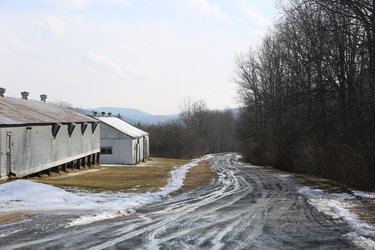Albany County may take over Switzkill Farm development efforts
BERNE — The conundrum of what to do with Berne’s controversial Switzkill Farm property may soon be resolved, with all who have a stake in it getting what they want.
Berne Supervisor Dennis Palow — who, along with most of his Republican-backed colleagues, has been hoping to sell the 350-acre property to spare the taxpayers from funding necessary repairs and upkeep — announced at this week’s town board meeting that Albany County seems interested in establishing a partnership with the town, wherein the county would take on operation and maintenance costs in exchange for shared-use rights.
Mary Rozak, spokeswoman for Albany County Executive Daniel McCoy, confirmed that “conversations are ongoing” between the county and town over a shared-use agreement, and said that full transfer of ownership to the county was also discussed. She declined to answer any other questions.
The county owns Lawson Lake County Park — originally a church camp and then used by Boys & Girls Clubs — which is open to residents for outdoor recreation year-round and also hosts summer youth programs. Highway Superintendent Randy Bashwinger brought up that park at the meeting as an example of how well the county develops such properties.
Although Rozak said discussion with the town touched on what transfer of ownership would look like, conversation during the Berne meeting centered around the shared-use scenario.
“What that means is, we’ll still be involved, and our board will still be able to make decisions up at Switzkill Farm,” Palow said, “but the county would be involved more, and anything that needs to be done up there, the county will pay for. It will not be coming … out of our budget, and our residents will still be able to rent it and that revenue will come to the town.”
Palow added that the town “would have priority on using it” over the county.
Switzkill Farm was purchased by the town of Berne from a Buddhist organization, the Tenzin Gyatso Institute, in 2014 with half the funds contributed by the Open Space Institute; the Albany County Industrial Development Agency, a not-for-profit public benefit corporation of New York State, contributed $125,000.
The Mohawk Hudson Land Conservancy had a conservation easement placed over most of the property.
The town has since rented the property for weddings; hosted educational programs; and held celebrations there, like Winterfest.
Although the town paid only $142,700 — which covered costs towards closing and easements as well as towards acquisition — some residents and even board members at the time felt uneasy about the speed with which the transaction was finalized.
Resentments grew as the town had to put more money into the property for repairs and maintenance, ultimately becoming a staple political issue in election campaigns, with Republican-backed candidates largely railing against the town’s ownership.
When the Republican Party took control of the town board in 2020, holding a 4-to-1 majority, it began taking efforts to relinquish the property, or otherwise undermine it by cutting funding and canceling events there, as well as defanging the advisory board that oversaw the property.
In 2020, Palow, who was then deputy supervisor, claimed that the purchase was illegitimate because it was made without residents being notified of their right to a permissive referendum, and that the town was vulnerable to a lawsuit. A lawsuit filed by Berne resident and political player Tom Spargo soon followed, attempting to reverse the purchase. The suit was later dropped.
In 2021, the town board voted to have the property appraised with the intent to sell it, though this would have been a complicated endeavor, not least of all because the conservation easement would make the property unattractive to most developers. The board also canceled the contract it held with Nelson Kent, who lived on the property as a caretaker.
Every step of the way, certain residents, including Kevin Crosier, the Democrat who was supervisor when the property was purchased, have pushed back hard against the board’s actions on the property, accusing it of being vengeful or negligent.
In addition to announcing the ongoing talks, Palow also said at Wednesday’s meeting that a partnership offer was made by McCoy back when the property purchase was still being discussed, but that it was declined for reasons unknown.
Crosier denied this.
“I wanted to have a partnership with the county because we had done so much together,” Crosier told The Enterprise this week, “but in the end, [McCoy] decided that maybe the town should just do it … But no, there was never anything like that [offer] ever made.”
Rozak would not confirm whether this offer was indeed made.
The new developments with Albany County — whether it would involve a shared-use agreement or transfer of ownership — would give the town the best of both worlds: the ability to enjoy the property, which is widely characterized as a local gem that has the potential to boost tourism, while not having to funnel in taxpayer money to realize that potential.
Crosier said this week that such an agreement would be “awesome for the town,” and Mohawk Hudson Land Conservancy Director Mark King, who was not previously aware of these talks, said that the situation as described by The Enterprise seemed “promising.”



